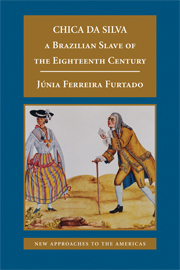Book contents
- Frontmatter
- Contents
- Acknowledgments
- Preface
- Maps
- Introduction to the English Edition
- 1 Land of Stars
- 2 Chica da Silva
- 3 The Diamond Contractors
- 4 Black Diamond
- 5 The Lady of Tejuco
- 6 Life in the Village
- 7 Mines of Splendor
- 8 Separation
- 9 Disputes
- 10 Destinies
- 11 Chica-que-manda
- Abbreviations
- Suggested Reading
- Index
- Plate section
8 - Separation
Published online by Cambridge University Press: 05 September 2014
- Frontmatter
- Contents
- Acknowledgments
- Preface
- Maps
- Introduction to the English Edition
- 1 Land of Stars
- 2 Chica da Silva
- 3 The Diamond Contractors
- 4 Black Diamond
- 5 The Lady of Tejuco
- 6 Life in the Village
- 7 Mines of Splendor
- 8 Separation
- 9 Disputes
- 10 Destinies
- 11 Chica-que-manda
- Abbreviations
- Suggested Reading
- Index
- Plate section
Summary
And from there proceeded to the Court
The owner of Serro do Frio.
THE HOUSE IN LAPA
After sealing the fourth diamond contract, the father, Sergeant Major João Fernandes de Oliveira, settled definitively in the Realm where, thanks to the friendship he had zealously woven with the governor of Minas Gerais, Gomes Freire de Andrade, he began to frequent the higher echelons of the court and won the confidence of the powerful Sebastião José de Carvalho e Melo, the Count of Oeiras and future Marquis of Pombal. In the meantime, his son, the chief judge, having been carefully educated in Portugal, established himself in Tejuco where he was to manage the diamond contract.
The strategy employed by the Fernandes de Oliveira family was common among the wealthy men of business. As relations of power in the Portuguese Empire were of a private nature, success in one's endeavours relied upon close and daily contact with the powerful and especially with the king. Based on the same premises, business relations intermingled with family, and it was not unusual to have various members of a family occupying positions in the same company. In general, while one or two looked after business, another had to frequent the court to canvass for favors, concessions, and privileges.
Similar behavior could be observed among some of the most important Portuguese corporations and business families of the eighteenth century, such as the Pinto de Miranda and Pinheiro families.
Information
- Type
- Chapter
- Information
- Chica da SilvaA Brazilian Slave of the Eighteenth Century, pp. 211 - 238Publisher: Cambridge University PressPrint publication year: 2008
